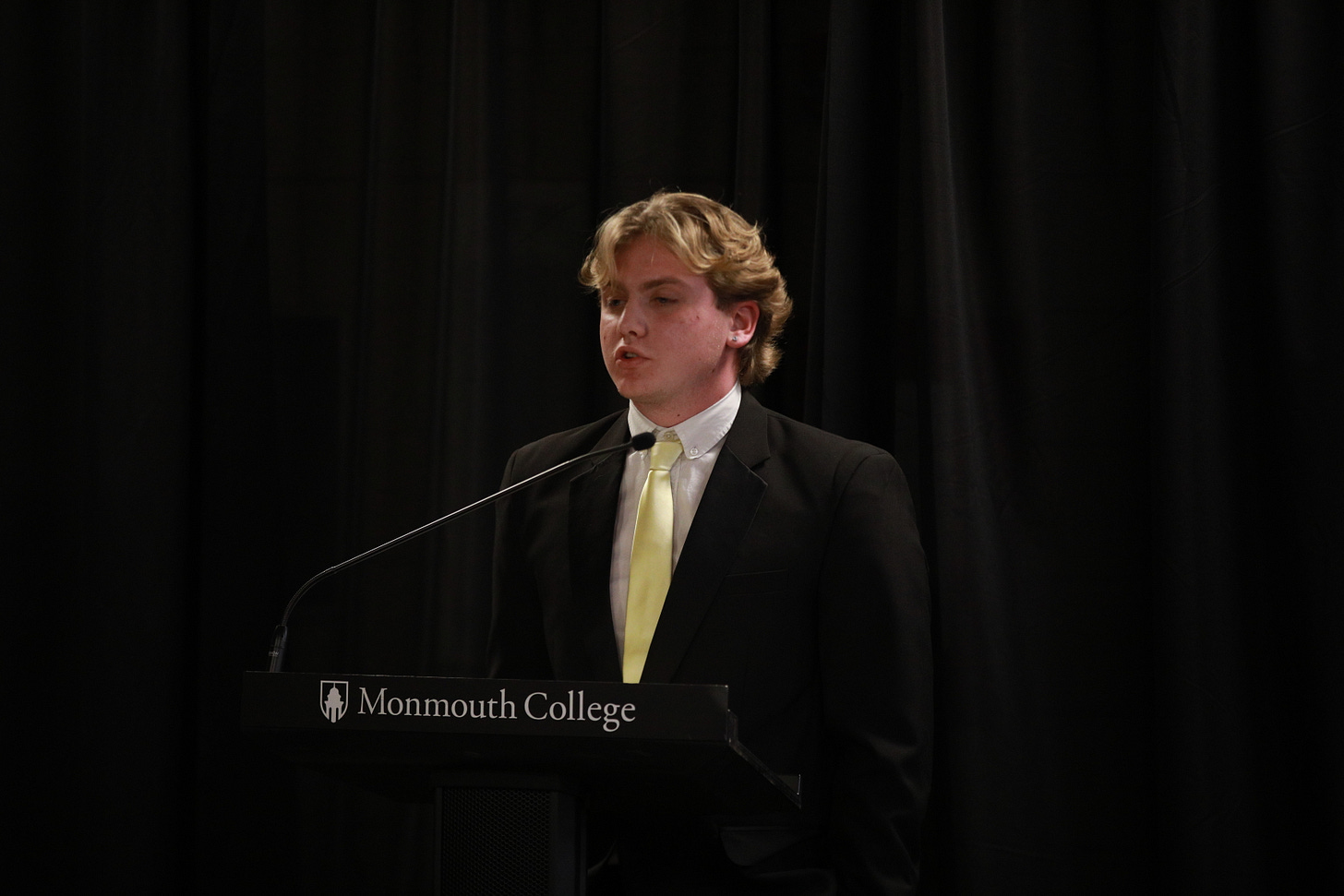A defense of university rights wins 2025 Monmouth College Moot Court Competition for Calvin Wellman
Seamus O'Sullivan - Features Editor
Monmouth College’s annual Moot Court competition reached its conclusion last Tuesday, as sophomore Calvin Wellman was named the 2025 champion after delivering what judges called the most compelling legal argument in the final round. The event, which simulates Supreme Court proceedings, centered on the fictional case of William DeNolf v. Olympus State University, a constitutional dispute testing both First and Fourteenth Amendment principles.
Competition winner Calvin Welman. Photo from MC Flickr
The case featured DeNolf, an employee of Olympus State University (OSU) who was denied admission to its graduate school and later dismissed from his job. DeNolf claimed the university violated his Fourteenth Amendment right to equal protection by discriminating against him based on sex, and further alleged his First Amendment rights were infringed when he was fired. OSU, on the other hand, argued that its actions were lawful and consistent with university policy.
The competition began with 14 student participants in the preliminary round, before narrowing to just four finalists: Andrew Himpsl (sophomore) and Emily Leshin (junior) representing the petitioner, and Nora Collins (freshman) alongside Calvin Wellman (sophomore) representing the respondent. The final round was judged by a panel headed by Hon. James G. Baber of Illinois’s Ninth Judicial Circuit.
When the gavel fell, it was Wellman who impressed the judges most. His task was to defend OSU’s decision to terminate DeNolf’s employment; a challenge he met with composure and constitutional precision. “It feels good,” Wellman said after his win. “I’m proud of all the effort that I put in. And I’m also proud of my competition because they really pushed me to be the best that I could be.”
Surprisingly, Wellman revealed that his preparation began just days before the competition. “I started preparing the Thursday before, like seriously preparing,” he admitted. “I had read the case weeks before but didn’t do anything with it until then. I put in a bunch of time on Thursday and Friday to make sure I got what I needed.”
That late start didn’t seem to hurt him, continuing what seems to be a Moot Court trend, as last year’s winner, Karli Stom ‘25, reportedly prepared in similar fashion. When asked about the most challenging aspect of the process, Wellman pointed to the difficulty of mastering precedent. “It’s the cases that set the precedent that trip a lot of people up,” he explained. “If you know what each one is about, you’re able to answer questions better and act like you know what you’re talking about to the judges.”
Wellman credited much of his success to his background in public speaking. “I went to a high school that was a magnet school, and I had to give oral presentations every two weeks,” he said. “It’s not that public speaking doesn’t scare me, it does, but when I get up there, I know what I’m going to talk about. The scariest part is just the uncertainty.”
The Moot Court program, led by Political Science chair Mike Nelson and supported by gives Monmouth students a chance to sharpen their constitutional reasoning and advocacy skills in front of practicing judges and lawyers.
With another competition in the books, Wellman’s victory adds to the growing reputation of Monmouth’s Moot Court as a training ground for some of the college’s sharpest legal minds proving that even with limited preparation, confidence, clarity, and command of the Constitution can carry the day.


